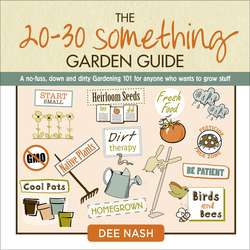Читать книгу The 20-30 Something Garden Guide - Dee Nash - Страница 9
На сайте Литреса книга снята с продажи.
A GARDENER’S GLOSSARY
ОглавлениеAlthough no garden glossary is complete, below are a few vegetable-growing terms you’ll find helpful.
* * *
Aeration – The loosening of soil or other matter by various means, allowing air to pass freely through it.
Acidic Soil – Soil with a pH reading below 7.0; soil measuring above 7.0 pH is called alkaline. Drier soils tend to be more alkaline. Use a soil test to determine pH along with other factors.
Amendment – Organic material added to soil to improve it.
Annual – A plant that completes its entire growth cycle from seed to bloom and again to seed in one year’s time.
Beneficial Insects – Insects that improve the soil (e.g., earthworms), pollinate plants, or control harmful insects and other garden pests.
Biennial – A plant that takes two seasons to complete its life cycle, flowering and producing seed in the second year.
Blossom End Rot – A disorder of tomatoes, peppers and eggplant caused by a lack of calcium. Uneven watering and drought are also factors.
Bolting – When a cold-weather plant, like spinach or kale, is stressed by heat, causing it to flower and set seed if left in place. All is not lost: you can eat these flowers, too.
Cloche – A glass or plastic cover meant to protect plants from cold temperatures or animals.
Companion Planting – Growing one or more plants together because they perform well in the same space and benefit each other.
Compost – Organic humus created by layering green and brown matter and allowing them to decompose. Great for the garden, it helps maintain soil moisture and temperature while also balancing soil organisms to prevent disease and improve fertility.
Cultivar – A plant variety or strain produced in cultivation through breeding or selection.
Cutworm – Worm-like larvae of any variety of moth that curls up into a C-shape and cuts plants off at soil level. Often green, brown or yellow with stripes. Various methods are used to foil these creatures when new plants are set out into the garden.
Dormancy – The act of a plant not producing growth and being in a state of stasis. Dormant oils are a natural pest control, sprayed when fruit trees and other perennials are dormant.
GMO – Genetically modified organism, meaning its genetic material is modified using genetic engineering. GMO foods are often a result of gene splicing from two different species.
Heirloom Plants – Time-tested, open-pollinated plants passed down from more than one generation of gardeners often in a particular region – often having more vigor and disease resistance for that region.
Hybrid – Controlled crosses of two parent plant varieties. They are not GMOs.
Mesclun – A mix of assorted young salad greens from lettuces and other greens like mustard, radicchio and arugula.
Mulch – Shredded leaves, compost, chopped bark or any other material which will decay over time, but is spread beneath plants to improve the soil, moderate soil temperature, and retain moisture. Rubber “mulch” does not count.
OMRI-Listed – A product tested and certified by the Organic Materials Review Institute, http://www.omri.org/.
Open Pollinated – Plants that are pollinated by the wind, insects, birds, etc. (See Heirloom Plants.)
Overwinter – To keep plants alive over the winter by bringing them indoors or into a greenhouse.
Perennial – A plant that lives and grows for several consecutive years in place. Some plants are considered hardy perennials because they are tolerant of freezes. Plant hardiness, however, is determined by where the gardener lives. Rosemary may be hardy in some parts of the country and not in others.
Potager – A kitchen garden formally laid out with defined areas. It may contain vegetables, flowers and herbs, but is primarily a kitchen garden, usually located nearby.
Sow – To plant seed. Direct Sow means to plant seeds outdoors directly into the soil in which they will grow.
Three Sisters Planting – Corn, squash and beans planted in concert. Corn first, for structure to support the climbing beans; squash beneath, to shade the others’ roots. (Summer melons can be planted in place of squash.) Derived from plantings done by the Iroquois and other Native American tribes.
Thinning – The process of removing some seedlings in order to give others room to grow and produce.
Top Dress – The process of amending the soil by adding a thin layer of fertilizer, like manure, to the surface of the soil.
Zones – Refers to plant hardiness zones in various areas and average ranges of temperatures. See www.planthardiness.ars.usda.gov/
